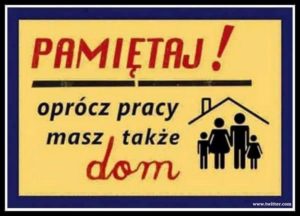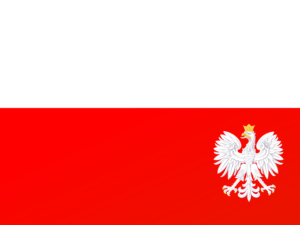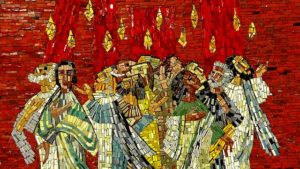On 6 of March 2019 is Ash Wednesday – the first day of Lent in the Catholic calendar. It is a period of atonement before Easter. According to Catholic rites, on that day the priest sprinkles the heads of the faithful with ashes.
In February 2019, we celebrate Valentine’s Day (February 14) – a day of lovers and Fat Thursday (February 28) – that is a day of sweetlovers.
The calendar of holidays in 2019:
1 January (Tuesday) – New Year
6 January (Sunday) – The Feast of Epiphany
21 April (Sunday) – The Easter Sunday
22 April (Monday) – The Easter Monday
1 May (Wednesday) – The Labor Day
3 May (Friday) – The Constitution Day
9 June (Sunday) – The Pentecost
20 June (Thursday) – The Corpus Christi
15 August (Thursday) – The Polish Army’s Day
1 November (Friday) – The All Saint’s Day
11 November (Monday) – The Independence Day
25 i 26 December (Wednesday and Thursday) – The Christmas Day
Did you know that Human Rights Day is observed every year on 10 December? The World Human Rights Day is celebrated every year on the anniversary of the Universal Declaration of Human Rights. This year the Universal Declaration of Human Rights turns 70! Check more here
On 12 of November 2018 is a National Holiday and a day off from work on the occasion of 100th anniversary of regaining independence of Poland. November 12 will be a day off for trade employees.

The calendar of holidays in 2017
You won’t deal with formalities in most of the institutions in the whole country on these days:
| January 1 – New Year
January 6 – The Feast of Epiphany April 16 – The Easter Sunday April 17 – The Easter Monday |
May 1 – The Labor Day
May 3 – The Constitution Day June 4 – The Pentecost June 15 – The Corpus Christi |
August 15 – The Polish Army’s Day
November 1 – The All Saints’ Day November 11 – The Independence Day December 25 – The Christmas Day December 26 – The second day of Christmas |
 The calendar of holidays in 2016
The calendar of holidays in 2016
You won’t deal with formalities in most of the institutions in the whole country on these days:
| January 1 – New Year
January 6 – The Feast of Epiphany March 27 – The Easter Sunday March 28 – The Easter Monday |
May 1 – The Labor Day
May 3 – The Constitution Day May 15 – The Pentecost May 26 – The Corpus Christi |
August 15 – The Polish Army’s Day
November 1 – The All Saint’s Day November 11 – The Independence Day December 25 – The Christmas Day December 26 – The second day of Christmas |
A Name Day
A Name Day ceremony is celebrated as a birthday, but not because of the day of birth, but due to the name.
On each day of the year we celebrate the specific Name Day. To celebrate your Name Day you need to look to the calendar to find out when it is.
 Workdays in Poland
Workdays in Poland
In Poland workdays are: Mondays, Tuesdays, Wednesdays, Thursdays and Fridays.
Only these days you can deal with the administrative issues.
On Saturdays and Sundays administration and authorities offices are closed.
Public libraries, most post offices, some shops, banks can be closed or can be opened on specific opening hours.
A non-working day
You can hear that there is a non-working day or this is a free day. What does it mean? It means that this is a holiday so schools, universities, administration, libraries, shops, shopping malls, pharmacies don’t work. There are only few places working: some pharmacies 24/7, some cinemas and theatres, petrol stations, some restaurants and hotels. Check carefully whether some holidays are non-working days and do shopping before.
 January 1 – The New Year’s Day
January 1 – The New Year’s Day
Every year we start a new year on the 1st of January. It is the national holiday so it is a non-working day. The New Year’s Day in Poland is started with a glass of champagne in the company of close relatives or friends, watching fireworks outside.
 January 6 – The Feast of Epiphany
January 6 – The Feast of Epiphany
This holiday and a non-working day is on the 6th of January every year and it has been established to commemorate the Three Kings who had came to Bethlehem to cherish Jesus. This day in the Catholic Church incense and chalk are blessed and then people sign the outside door. In many cities there is the Three Kings Procession – the special walk in costumes.
 Easter
Easter
The date of the holiday and non-working days is changeable every year. The holiday lasts 2 days and it is celebrated in the Catholic Church and in families. In Poland Great Sunday starts with procession at 6 a.m. which is the sign of joy of Resurrection. Families and friends organize special Easter Breakfast where people share food blessed a day before. In Holy Monday called Śmigus-Dyngus kids spoil water on each other, and grown men spoil perfumes on women.
May 1 – Labour Day
On the 1st of May we celebrate Labour Day. It is the meaningful event because it symbols how crucial is people’s work. It is also a non-working day.
 May 3 – Constitution of May 3 Day
May 3 – Constitution of May 3 Day
Have you ever been to the celebration of the 3rd of May in Poland? In Lublin it is a very special celebration. It usually starts in the morning with a Holy Mass. Then, there is a celebration on the Litewski Place. Our army presents their representatives and they make a salvo of honor for the event of the Constitution of 3rd of May in 1791. It is a must see in Lublin just to see our customs, tradition and a history. It is a non-working day.
 Pentecost
Pentecost
The date of Pentecost is changeable. It is a holy day in the Catholic Church reminding of the Holy Spirit. Despite this day comes always in Sunday, this Sunday shopping malls are closed. This day you can see trees or branch of birch-tree that symbols waking up the whole nature.
Corpus Christi
Corpus Christi is a catholic holy day that comes always in Thursday and is a non-working day. This day is connected with establishing the Eucharist. During this special Holy Mass there is a procession to 4 altars – sometimes around a church, sometimes around the whole parish or its main streets.

August 15 – The Assumption of Mary into Heaven
In the 15th of August we celebrate The Assumption of Mary into Heaven in the Catholic Church when people bring fresh herbs and yields to bless them. This non-working day we also celebrate the Day of Polish Army when the special army parade is organized.
 November 1 – All Saints’ Day
November 1 – All Saints’ Day
It is a catholic holiday when we commemorate all dead Saints. There is a special Holy Mass in the Catholic Church. This and next day, which is All Souls’ Day, people go on graves of their relatives to decorate their graves by flowers and fire candles as a sign of a memory.
In our Polish culture it is the time of reflection, praying and remembering of dead people. It is a non-working day.

November 11 – Independence Day
It is to commemorate becoming an independent country in 1918. This day there are parades, military shows and patriotic concerts. This national day is also a non-working day.
 December 25, 26 – Christmas
December 25, 26 – Christmas
Christmas is one of the favorite holidays in Poland. In the evening of the 24th of December we make a special supper before Christmas. At noon there is a Midnight Mass where the joyful news about newly born Jesus is spread. These days are spent in celebration and meetings with friends and family. Both days are non-working days.
 The 8th of March – International Women’s Day
The 8th of March – International Women’s Day
This day was a national holiday. Special meetings and workers’ marches were held. Many older generations of women still associate this feast with the communist propaganda.
For younger ladies this day has a slightly different meaning. For them it is more connected with male sympathy with women. According to the contemporary customs women are given small presents in the Women’s Day. Some men buy traditionally sweets or flowers, mainly tulips.
 Majówka – the 1st – 3rd Mai or longer
Majówka – the 1st – 3rd Mai or longer
You can hear a term “Majówka”. It has a double meaning. In the Catholic Church, it is the special praying sung in Mai. In the old times, this praying was sung near small chapels decorated by flowers, standing near the roads. “Majówka” is also so called a long weekend – days nearby the dates of the 1st and 3rd Mai. The Poles take days off in the dates before this holiday to lengthen the weekend. People leave the city going on trips.
 Prima Aprilis – the 1st of April
Prima Aprilis – the 1st of April
The 1st of April is a day of pranks and jokes. In Poland it is really popular.
In the media, in newspapers you can find many funny stories and untrue facts that make you fool.
Be careful not to be tricked.
 21st of March – The first day of Spring
21st of March – The first day of Spring
21st of March is the beginning of the calendar Spring.
Kids are making a special doll that they sink in the river or in a lake to celebrate that the Winter is ending. In general, Pupils and students don’t go on classes and lectures because it is so called “the Truancy day”.
 The 1st of June – The Children’s Day
The 1st of June – The Children’s Day
Do you have a child or younger siblings? Do not forget about The Children’s Day then. It is on the 1st of June.
That day there are many special events for kids in cinemas, culture places and shopping malls.
 The 6th of December – the Saint Nicholas Day
The 6th of December – the Saint Nicholas Day
In Poland, St. Nicholas brings gifts in the night on the 5th/6th of December. Children hope that under the pillow or near their beds they will find sweets, toys, fruit in the morning. Naughty kids get also silver or golden twigs as a sign that next year they need to be better for their parents. And here St. Nicholas comes as a bishop in bright or red clothes, carrying a golden stick, which resembles a shepherd hook. Going down from the heaven with the Angel as an assistant, St. Nicholas is traveling around the country on foot, leaving gifts to obedient kids.
 26th of May – The Mother’s Day
26th of May – The Mother’s Day
Don’t forget that not only in Poland we celebrate the Mother’s Day.
This day every mom should be given a nice word, sweets, flowers, cards or some other little gift from her children.
 23 th of June – Father’s Day
23 th of June – Father’s Day
Don’t forget that not only in Poland we celebrate the Father’s Day.
This day every dad should be given a nice word, sweets, flowers, cards or some other little gift from her children.
 21st and 22nd of January – Grandmother’s and Grandfather’s Day
21st and 22nd of January – Grandmother’s and Grandfather’s Day
These days are dedicated to Grandma and Grandpa so as their grandchild don’t forget to visit your grandparents.
A nice word, sweets, flowers, cards or some other little gifts from grandchildren can be a good idea.
 31st of December – Sylvester, The New Year’s Eve
31st of December – Sylvester, The New Year’s Eve
On the 31st of December we finish a year and on the 1st of January we start a new one.
This night people invite each other for a party or go on organized party – the tickets for it they buy much earlier. On the 1st of January is the New Year’s Day is a non-working day.


